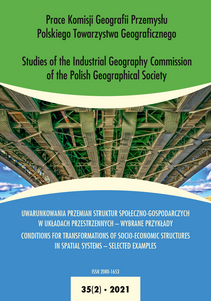Prospects for the improvement of interregional cooperation in Russia (based on the example of the Siberian regions)
Prospects for the improvement of interregional cooperation in Russia (based on the example of the Siberian regions)
Author(s): Sergey ViolinSubject(s): National Economy, Regional Geography, Public Administration, Economic policy, Government/Political systems, Economic development, Transformation Period (1990 - 2010), Present Times (2010 - today)
Published by: Wydawnictwo Uniwersytetu Komisji Edukacji Narodowej w Krakowie
Keywords: coordination; interregional cooperation; regional policy; Russian economic policy; spatial development;
Summary/Abstract: In the Russian Federation, interregional cooperation is limited, which negatively affects regional development and contributes to growing regional disparities. The goal of this research is to gain better understanding for slow and inconsistent development of interregional relations in Russia. The main hypothesis is that the lack of proper coordination and communication between the federal and regional levels of government, between regions themselves, as well as between regional authorities and other stakeholders in regions’ development is one of the key problems that hampers development of interregional cooperation in contemporary Russia. Retrospective, statistical, and content analysis were used to test this hypothesis. The analysis of the federal policy toward regional development since 1990 has shown gradual increase in centralisation of authority. The regional policy stimulated interregional competition and dependence on federal investments and subsidies. Nevertheless, the study of strategic plans of Siberian regions shows that with proper coordination and communication between interested parties some of the problems inhibiting interregional cooperation can be resolved. Better coordination, in turn, requires improvement of the institutional infrastructure. The findings are relevant for policy makers and scholars in the field of regional development. Further research is needed concerning the most efficient forms of coordination institutions.
Journal: Prace Komisji Geografii Przemysłu Polskiego Towarzystwa Geograficznego
- Issue Year: 35/2021
- Issue No: 2
- Page Range: 85-99
- Page Count: 15
- Language: English

